"We are familiar with the smell of the mountains here and the taste of sour fish, so we can't forget the time we spent in Majiang, and hope our research can make the life of Majiang people better and better! On July 21, Liu Shumin and Zhao Chenxiao, graduate students from the School of Horticulture, Nanjing Agricultural University, will depart for home after spending 45 days at the graduate workstation in Majiang, Guizhou, China.
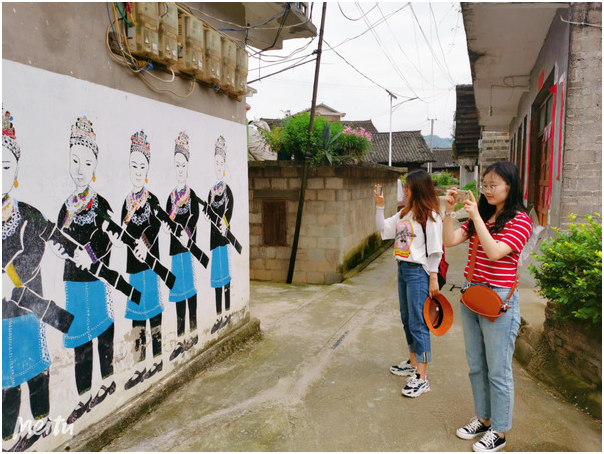
Liu Shumin and Zhao Chenxiao, graduate students from the School of Horticulture of NANO, researching
cultural villages in Xuanwei Township
Guizhou Majiang is the university's targeted poverty-alleviation county, and in April 2019, the Guizhou Provincial People's Government officially approved the withdrawal of Majiang County from the sequence of poverty-stricken counties. "Take off the cap without taking off the responsibility, take off the cap without taking off the help", in order to better match the industrial needs of Majiang and integrate graduate education into the great cause of rural revitalization, on November 2, 2019, NANO moved the graduate workstation to this mountain in southeast Qianjiang.
Liu Shumin and Zhao Chenxiao are the first batch of graduate students stationed in the workstation.
Integration: multidisciplinary help for a new system of three-dimensional industry in the countryside
Nanjing Agricultural University has 202 postgraduate workstations around the country, but this one is unique.
"This is a three-dimensional integrated, demand-oriented graduate workstation," said Dong Weichun, vice president and dean of the graduate school at NAU, "The resident subject group integrates multiple disciplinary categories of plant and animal production, food processing, and humanities and social sciences to serve in a three-dimensional manner the planting, breeding, food processing, and rural cultural construction and other industrial needs, hoping to further promote the development of rural Majiang and increase the internal core power of rural revitalization in Majiang."
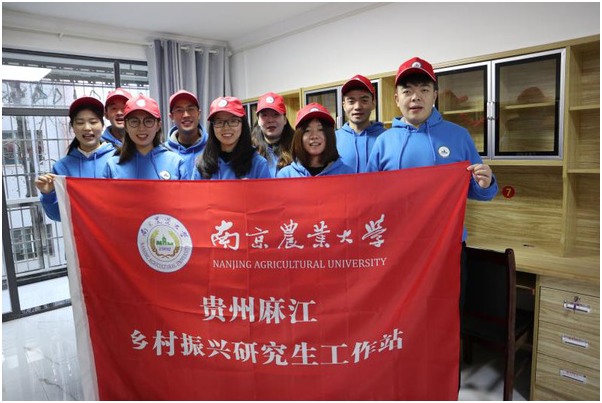
A group photo of the members of the postgraduate workstation of rural revitalization in Majiang,
Guizhou, South China Agricultural University
In the past few days, Liu Shumin and Guo Hao, a graduate student of the University's College of Animal Science, and Li Sujin and Liao Weihua, graduate students of the College of Food Science, were working side by side in Majiang. Guo Hao is busy with research on the pig industry in Majiang; Liao Weihua, under the guidance of his supervisor, Professor Han Yongbin, is following his sister's research on "key technology and industrialization development of probiotic fermented blueberry juice quality improvement".
"I had only heard that Majiang blueberry was famous before, but now I am more familiar with Majiang than my hometown." Liao Weihua is a native of Guizhou, and his home is in Guiyang. When he first enrolled this year, Mr. Han suggested he come to Majiang to adapt to his "new role" as a graduate student in advance.
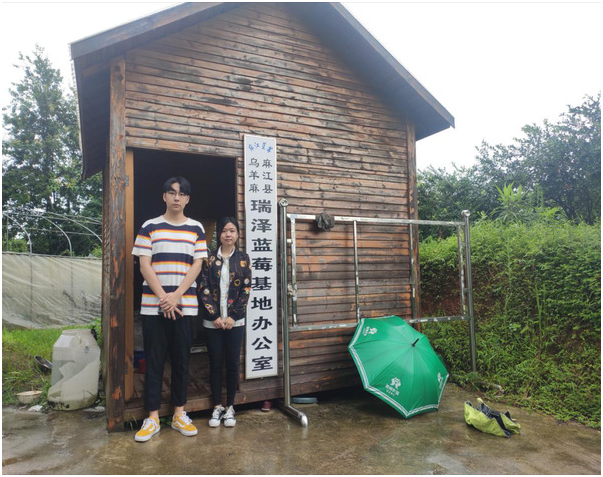
Li Sujin and Liao Weihua, graduate students from the School of Food of NANO, researching in the blueberry base
"Our research is fermented blueberry juice, good raw materials to have good products, so the source must be good. During this time, we have researched from the planting base to the harvesting site, and then to the leading enterprise of blueberry deep processing, for the grade classification of the fruit and product packaging." Li Sujin, a second-year student, said they brought some local fermentation solution back to NANO for experiments to screen out beneficial strains of bacteria and analyze their composition as a way to determine the strains of fermented Majiang blueberries and optimize the product process. "This is exactly part of our whole project to alleviate poverty in Majiang blueberry, pre-research, post-test."
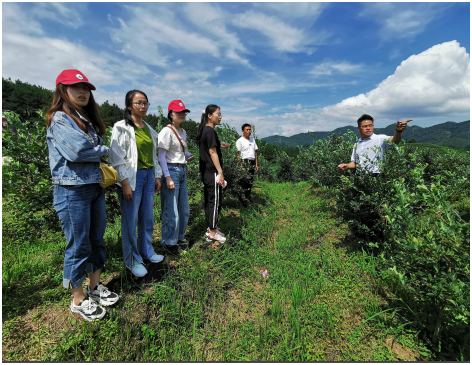
Graduate students from NANO research blueberry industry in Qingshan Village
Majiang people have been holding the word "agriculture" to do articles, "the largest blueberry base county in southern China," "China's red garlic township," "China's zinc and selenium rice township " reputation is far away. In order to precisely match these characteristic industries, only in the first half of 2020, this graduate workstation built in the mountains covers a number of poverty alleviation projects such as blueberry juice quality improvement, zinc and selenium rice cultivation, chrysanthemum new varieties breeding, pig industry development, rural public cultural space construction.
"We hope to form a group of teams, overcome a number of problems, train a group of talents and enrich a group of people. Organic integration of rural industrial development and university talent training, organic integration of solving practical problems in agriculture and rural areas and poverty alleviation, organic integration of the university's disciplinary advantages and industrial characteristics of Majiang." Dong Weichun said.
Bursting: mentors inside and outside the university "rub" a new spark of industrial development
"The graduate students in Majiang have two mentors inside and outside the university, which is our 'welfare'!" Liu Shumin and Zhao Chenxiao said proudly. This "benefit" actually stems from the perfect combination of NANO's disciplinary advantages and Majiang's industrial characteristics. Before coming to Majiang, they had collected a lot of information about Majiang and planned to conduct a research on "cultural and creative IP and agricultural industry". After arriving in Majiang, Jin Debiao, Deputy Director of the County Agricultural and Rural Bureau, became their off-campus mentor. Mr. Jin has lived and worked in Majiang for most of his life, and is a native of Majiang. He knows every grass and tree here. Liu Shumin and Zhao Chenxiao, who were new to the area, were excited to think about their research plans to Mr. Jin, hoping to get support and encouragement from their external mentor. "Your ideas are good, but I would prefer that you focus on the current industrial situation in Majiang, such as solving the problems related to mountain agriculture, which is the most urgent need of the people of Majiang at this stage." Mr. Jin politely expressed a different suggestion. Liu Shumin and Zhao Chenxiao were a bit overwhelmed when their off-campus mentor unexpectedly "poured cold water" on them after they had carefully done their homework at home. That evening, they rushed to seek help online from their mentor, Wei Jiaxing, an associate professor at the School of Horticulture in Nanjing. "Mountain agriculture? That's probably a big topic!" Wei Jiaxing was worried that it would be difficult for them to navigate at this stage of their master's degree. How to take into account the local needs of Majiang, but also closely integrate with their major discipline, landscape architecture? After several discussions, Wei decided to guide the students to focus on the current tourism industry path of Majiang - "planning of ethnic villages with integrated development of agriculture, culture, tourism and recreation".
With Wei's guidance, Liu Shumin and Zhao Chenxiao hurriedly adjusted their research direction. In the following days, their external supervisor, Jin Debiao, helped them to contact resources, check information, go to villages, and do interviews, with Mr. Jin's full support. After several rounds of basic research, Mr. Jin suggested that they focus their research on the more distinctive village of Kawu.
Kawu's Yakgujiang Village is a famous chrysanthemum industrial park in Majiang, which became famous a few years ago for introducing new varieties of chrysanthemums from NANO and developing the flower industry. However, over the past few years, the village of Kawu, where the villagers live, has not been able to "ride on the east wind" to develop. Lack of tourism support, tourists can only "walk around", "nothing to see, nothing to play, and nothing to buy." Once the flowering period is over, what will the village rely on for development? How can we keep tourists all year round? How to revitalize the surrounding tourism industry? Seeing more and more problems surfacing, Wei Jiaxing decided to go to Majiang personally. "You also have to consider how chrysanthemums integrate with Miao culture, not 'two skins' ah." Wei Jiaxing specially invited Professor Jiang Weibing from the South Agricultural Horticultural College, a garden planning expert, to "take the pulse" for the village of Ka'u.
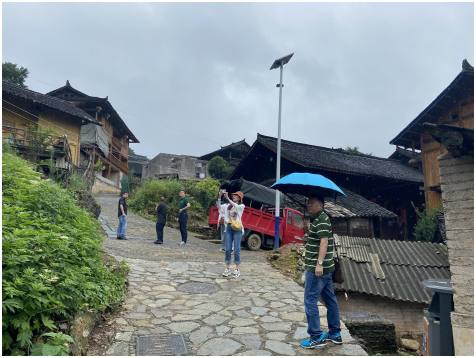
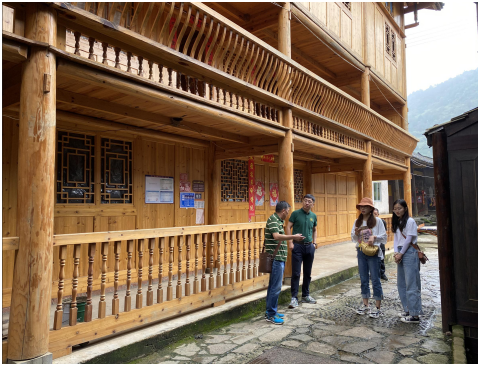
Professor Jiang Weibing, Professor Wei Jiaxing and postgraduate students from the
School of Horticulture of NANO in Ka'u village research
"This village is a national village with ethnic characteristics, with a strong Miao culture, good transportation location, and beautiful mountains, both natural scenery and humanistic style. You can consider how to adapt to the local conditions and avoid the shortcomings." With the collaborative guidance of mentors from inside and outside the university, Liu Shumin and Zhao Chenxiao feel that there is great potential in this green and green mountain. On-campus teachers provide the most advanced theoretical and scientific systems, and off-campus mentors build the most localized resources and platforms. With this "double insurance", the students' research projects continue to "spark" with new ideas. Although Li Sujin and Liao Weihua focus on blueberry fermentation, their research involves the whole industry chain system from planting to product packaging. The director of the blueberry office of the Majiang Agricultural and Rural Bureau, Wenguang Zhong, is their off-campus mentor. "I am a food major, planting knowledge is my weakness, Mr. Wen is an expert in blueberry planting and processing, his guidance is like giving us a shortcut to fill the gap in my knowledge of blueberry planting." Li Sujin said. "With the joint guidance of mentors inside and outside the school, doing research can be faster, more real and more objective." Guo Hao, who has been busy with pig industry research everywhere in the county for a while, also lamented that the on-campus mentor gave him the most advanced breeding concepts and methods, and Wang Chengjun, director of the county breed improvement station, as an off-campus mentor, has a holistic understanding of the local pig industry, allowing him to go deeper into the front line of the industry and get in touch with the most realistic pig breeding conditions. Now, the workstation of NANO Majiang has completed the construction of a working platform with 11 NANO on-campus mentors and 12 Majiang off-campus mentors. This scale will continue to expand with the deepening of the docking between disciplines and industries on both sides.
Experience: write the thesis in Majiang, the results will remain in Majiang
Zhu Yan is the local postgraduate workstation in Majiang "housekeeper", the afternoon of July 20, he received the task to go from the county town of Majiang nearly 40 kilometers away from the dog's head to pick up Guo Hao back to the station. Before that, he was alone in the mountains deep in the farmer's pig farm for 30 days. "That place is not even navigation, really wild mountains." More than an hour later, Zhu Yan's cell phone has been completely out of signal, all the way to ask the villagers, finally found it was too late to change out of work clothes Guo Hao. "You must remember to feed according to my method, never each pen equal amount of feeding, any problems at any time contact me." Before leaving, Guo Hao did not forget to tell the farmer Yang sister. Guo Hao, who confessed that he is particularly "fascinated" by pig farming, is a graduate student of Professor Huang Ruihua of the College of Animal Science. Professor Huang has a cooperative pig breeding farm in Huaiyin, Jiangsu Province, the land of fish and rice for many years, the young man put aside the excellent conditions to go, but picked a farmer pig farm deep in the mountains to intern. "The business with Mr. Huang is very mature in all aspects. Here in Majiang is a new 'enterprise + farmer' pig farming model, deeper contact with production to find more problems in the new model." Guo Hao was worried that the rearing density in this mountainous area was too high, and he specially measured the temperature and humidity in the mountains, which could bring more problems to pig breeding.
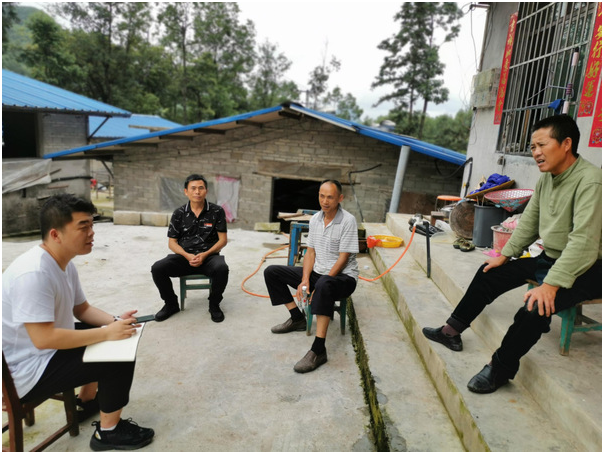
Guo Hao, a graduate student from the School of Food of NANO, researching at a farm in Cathead Village
After 30 days of squatting in farmers' homes, the young man lost a whole 10 pounds and confessed that Guo Hao, who usually does not do much housework at home, stretched out his hands with calluses. And back to the workstation the next day, care not to "catch up on sleep" he appeared again in a small restaurant. "But really no time to rub a meal, I heard that this bacon is very special, I came to talk to the boss about the family bacon workshop. In the afternoon I also had an appointment with the insurance company to talk about the issue of insurance coverage for hogs in Majiang ....... From the "downstream" slaughtering and food processing, enterprises, government, slaughterhouses, farmers' homes, vegetable markets, restaurants, insurance companies ...... Guo Hao ran through every possible place related to the hog industry; checked literature, did interviews, observed secretly, mixed and fed pigs, cleaned pig barns ...... He did everything to clean the pig house .......
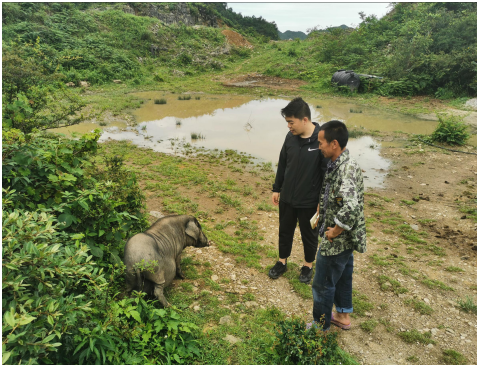
Guo Hao, a graduate student from the School of Food of NANO, researching pig farming in Shuicheng Village
"Go deep into the pig industry in Majiang to understand how the various links of the industry chain are connected." Guo Hao kept in mind the advice given to him by his mentor Huang Ruihua before coming to Majiang. "Now I have the most real and clear sense of this industry chain!" Guo Hao lamented that the trip had not been in vain, and that he had discovered many problems from it. For example, wild animals in the mountains may become a medium for the spread of African swine fever; high humidity in the mountains, improper storage methods for feed between feed may breed bacteria at any time ...... "These may bring hidden dangers of food safety, I hope to provide timely feedback to the company and relevant government departments, and present in the paper , so that more people pay attention to it." Guo Hao, who has taken his observations and research into every detail, already has his own ideas and insights about each link. "Production line equipment utilization rate is low, professional and technical personnel is insufficient, and product innovation ability has a lot of room for improvement ......" Li Sujin and Liao Weihua also wrote a summary of more than 3,000 words, from research findings, to problem reflection, to harvest growth. Nothing is too small. "Returning to the lab with problems will be more focused, and the results will be more grounded." Li Su Jin also completed the docking with blueberry deep processing enterprises, and the cooperation with Mr. Han's lab will continue to deepen. And Liao Weihua also determined the direction of his research: "on around the Majiang blueberry industry, but also better for the construction of the hometown to contribute!" "Shu Min and Chen Xiao in Majiang this time, not only academic more and more ideas, treatment of people in all aspects have been a comprehensive experience." When he first put them in Majiang, Wei Jiaxing was a little uneasy, but I did not expect that the two girls have now become his guide, culture, industry, policy can know a little, Mr. Wei is doubly pleased. "My research results will definitely stay in Majiang, and I hope to create a comprehensive combination of agriculture, culture, tourism and health tourism brand for Majiang." Liu Shumin has collected a thick pile of vivid and informative information, and will be able to write her graduation thesis with a clear mind when she arrives home. "The students have written their thesis on this land of hope and left the results in the future development of Majiang", Chen Ligen, secretary of the Party Committee of Nanjing Agricultural University, is full of expectation: "With this experience of crawling around, I believe they will grow up to be new talents who know and love agriculture and make greater contribution to the promotion of comprehensive rural They will make greater contributions to the revitalization of the countryside."
Secretariat of ACGS
Aug. 18th,2020

